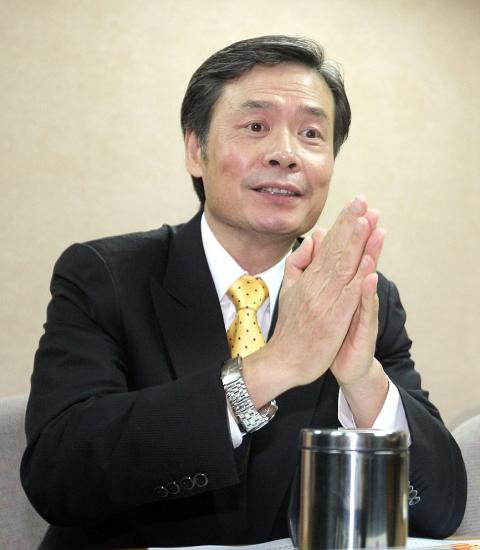Representative to the US King Pu-tsung (金溥聰) is to be appointed President Ma Ying-jeou’s (馬英九) chief adviser on national security affairs, a Presidential Office source said yesterday.
King is to take over the post of secretary-general of the National Security Council from Jason Yuan (袁健生), who is to be named a senior adviser to the president, the source said on condition of anonymity.
A “senior diplomat” will be appointed to fill the post of the nation’s representative to Washington, the source said, without giving a name.

Photo:CNA
The new appointments are part of the government’s efforts to promote regional peace and prosperity, and cope with new challenges in trade and economic relations with the US, cross-strait developments and changes in the national defense system, the source said.
In his new position, King will help the government improve its security cooperation with the US and push for Taiwan’s bid to join regional trade blocs, mainly the US-backed Trans-Pacific Partnership and ASEAN’s Regional Comprehensive Economic Partnership, the source said.
The connections that King has built in Washington during his posting will be very helpful to these efforts, the source said.
King replaced Yuan as head of the Taipei Economic and Cultural Representative Office in the US in December 2012.
King’s good political judgement and deep understanding of Taiwan’s situation can contribute to the government’s efforts to promote cross-strait ties, which have entered a new phase since the two sides began engaging in government-to-government exchanges, the source added.
Commenting on King’s new appointment, Democratic Progressive Party (DPP) spokesperson Chang Tun-han (張惇涵) yesterday said the Ma administration places little value on maintaining good Taiwan-US relations.
King lacks experience in handling cross-strait and national defense matters, and his transfer is not in the best interests of the nation, Chang said.
DPP Policy Research Committee executive director Joseph Wu (吳釗燮) said that King lacks the personal and professional experience to become the head of the National Security Council, a vital government unit tasked with overseeing cross-strait matters and foreign diplomacy.
Wu also questioned the timing of his transfer, with many suspecting it to be a ploy to manipulate the local elections in November.
The 57-year-old King, widely considered to be Ma’s closest aide, served as Taipei deputy mayor from 2004 to 2006, when Ma was mayor.
A year after he was elected president in 2008, Ma, who doubles as the Chinese Nationalist Party (KMT) chairman, appointed King as party secretary-general.
During the 2012 presidential election, King helped Ma with his re-election bid, serving as executive director of the president’s campaign office.
With a doctorate in journalism from the University of Texas in Austin, King has also taught at Taiwan’s National Chengchi University and at the Chinese University of Hong Kong.
In other news, the Executive Yuan yesterday said that Premier Jiang Yi-huah (江宜樺) had approved the resignation of Cabinet spokeswoman Cheng Li-wun (鄭麗文) and appointed Sun Lih-chyun (孫立群), vice chairman of the Fair Trade Commission (FTC), to take her place.
At the FTC, Sun succeeded in establishing a sound communication system between the administrative arm of the government and the media, the Cabinet said.
Additional reporting by Lee Hsin-fang

MAKING WAVES: China’s maritime militia could become a nontraditional threat in war, clogging up shipping lanes to prevent US or Japanese intervention, a report said About 1,900 Chinese ships flying flags of convenience and fishing vessels that participated in China’s military exercises around Taiwan last month and in January last year have been listed for monitoring, Coast Guard Administration (CGA) Deputy Director-General Hsieh Ching-chin (謝慶欽) said yesterday. Following amendments to the Commercial Port Act (商港法) and the Law of Ships (船舶法) last month, the CGA can designate possible berthing areas or deny ports of call for vessels suspected of loitering around areas where undersea cables can be accessed, Oceans Affairs Council Minister Kuan Bi-ling (管碧玲) said. The list of suspected ships, originally 300, had risen to about

DAREDEVIL: Honnold said it had always been a dream of his to climb Taipei 101, while a Netflix producer said the skyscraper was ‘a real icon of this country’ US climber Alex Honnold yesterday took on Taiwan’s tallest building, becoming the first person to scale Taipei 101 without a rope, harness or safety net. Hundreds of spectators gathered at the base of the 101-story skyscraper to watch Honnold, 40, embark on his daredevil feat, which was also broadcast live on Netflix. Dressed in a red T-shirt and yellow custom-made climbing shoes, Honnold swiftly moved up the southeast face of the glass and steel building. At one point, he stepped onto a platform midway up to wave down at fans and onlookers who were taking photos. People watching from inside

Japan’s strategic alliance with the US would collapse if Tokyo were to turn away from a conflict in Taiwan, Japanese Prime Minister Sanae Takaichi said yesterday, but distanced herself from previous comments that suggested a possible military response in such an event. Takaichi expressed her latest views on a nationally broadcast TV program late on Monday, where an opposition party leader criticized her for igniting tensions with China with the earlier remarks. Ties between Japan and China have sunk to the worst level in years after Takaichi said in November that a hypothetical Chinese attack on Taiwan could bring about a Japanese

The WHO ignored early COVID-19 warnings from Taiwan, US Deputy Secretary of Health and Human Services Jim O’Neill said on Friday, as part of justification for Washington withdrawing from the global health body. US Secretary of State Marco Rubio on Thursday said that the US was pulling out of the UN agency, as it failed to fulfill its responsibilities during the COVID-19 pandemic. The WHO “ignored early COVID warnings from Taiwan in 2019 by pretending Taiwan did not exist, O’Neill wrote on X on Friday, Taiwan time. “It ignored rigorous science and promoted lockdowns.” The US will “continue international coordination on infectious